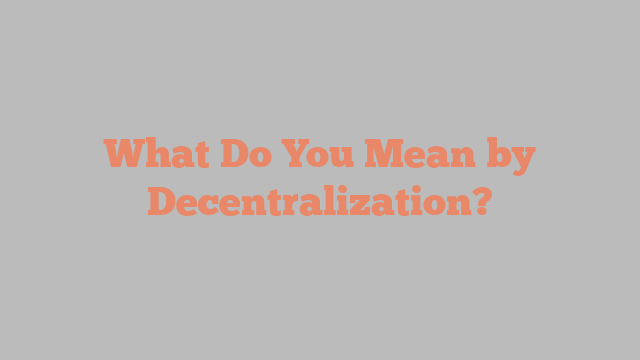Decentralization
Decentralization means allowing lower-level managers or employees to make some or all decisions. It allows for a more flexible structure and increases productivity. It can also improve communication. However, it comes with some risks. Decentralized companies need more training and monitoring than centralized organizations. Also, decentralization can lead to poor synergy and conflicting goals.
Decentralized organizations have daily operations and decision-making responsibilities shifted from top management to middle-and lower-level managers and sometimes even to team members. This allows upper-management to focus on growth opportunities and major decisions instead of routine tasks. It can also increase the effectiveness of managers because they have the expertise to make informed choices.

Governments often use Decentralization to improve the provision of basic services and the maintenance of order in outlying areas. They also do this to promote the local economy and encourage citizen involvement in decision-making. This is an important part of a democracy, and it can reduce corruption because people are more likely to hold the government accountable for its actions.
What Do You Mean by Decentralization?
Moreover, the closer the government is to citizens, the more responsive it is to their needs and problems. This is why many democracies are embracing the principle of subsidiarity, which says that each government function should be performed at the lowest level that is capable of performing it well.
Another reason for decentralization is when an organization grows too large to manage effectively from a central headquarters. An example of this is a company that offers multiple products. It might be able to manage its operations and marketing effectively when it offered two board games, but it would have a difficult time maintaining consistency and quality control as it expanded to offer more than that.
Businesses that are decentralized can also expand more easily by opening new locations. This is because they can give each new location independence in day-to-day activities without worrying that their company will collapse if they’re not there to oversee it.
In addition, a decentralized structure helps develop competence at all levels of the organization. Managers at all levels of the company can hone their skills and become more efficient, which increases their chances of getting promotions. This can also help a business in case one of its managers is sick or goes on vacation. The rest of the staff can pick up the slack and continue to function as normal.
Some disadvantages of decentralization include duplication of services, such as accounting and computer support, which could be more efficiently handled by a single department; conflicts between division manager goals and companywide goals; and loss of control at the top management level. However, some of these risks can be minimized if the top management has the right training and mentoring programs in place. They can also put policies and processes in place to ensure that decisions are made properly and consistently. Furthermore, they can monitor each division’s performance to ensure that it is meeting company goals. The key is to find the balance between decentralization and centralization, so that the benefits outweigh the negatives.
